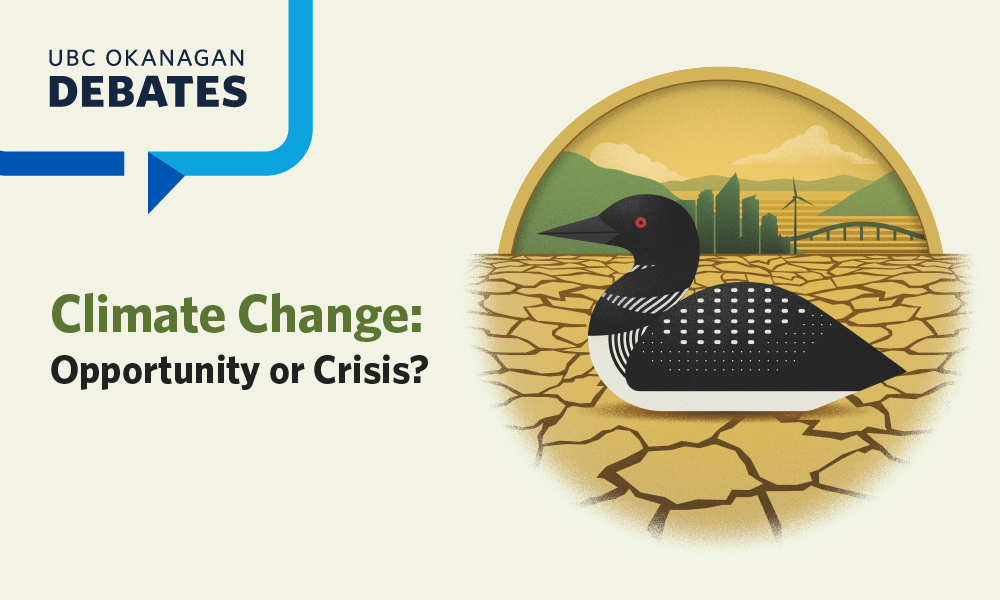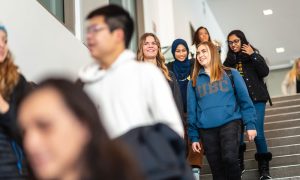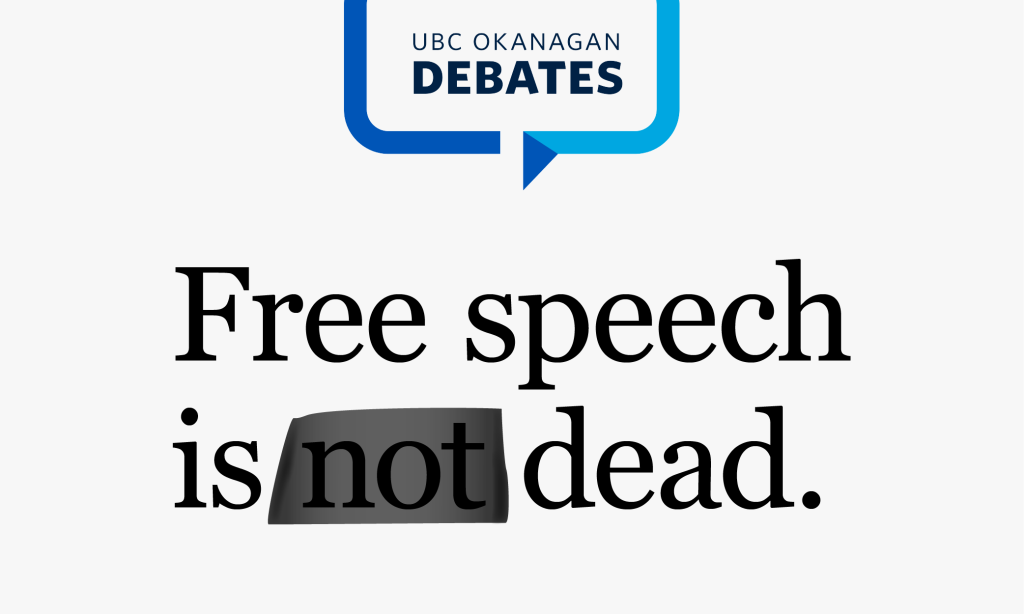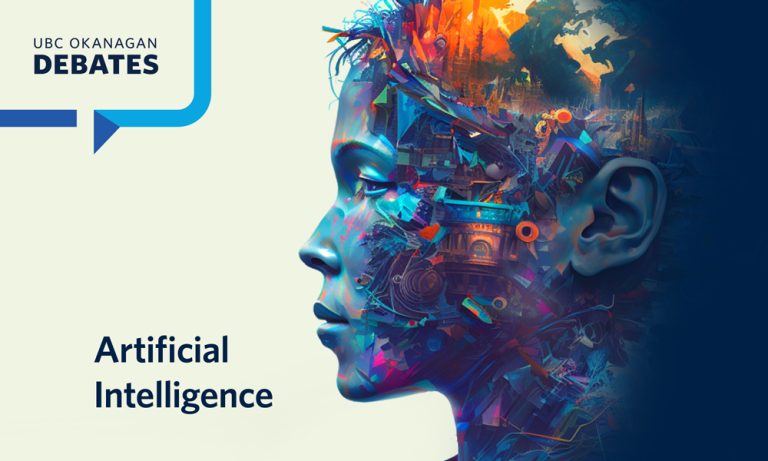Modelling civil discourse in a polarized world
What is UBC Okanagan Debates?
UBC Okanagan Debates seeks to bridge the gap between opposing views—creating a space where the community can engage serious topics with civility, respect and decency.
This signature event series was created to solve a problem: with so many communities stuck in echo chambers, there is no place to constructively address differences of opinion.
In response, civil discourse is a key function of UBC Okanagan Debates; allowing us to bring together renowned experts to discuss disputed and timely topics in a polarized world.
Read more about UBC Okanagan Debate’s principles and guidelines.
AI and us.
Sunday, March 1, 2026, 3–4:30 pm
Kelowna Community Theatre | 1375 Water St, Kelowna, BC
Stay in the know about upcoming UBC Okanagan events and updates. Subscribe now.
| By |  |
No technology has promised to reshape humanity as profoundly as artificial intelligence. Its promise—alongside its risks—now forces us to grapple with one of the most consequential debates of the 21st century.
Some argue that AI is a powerful tool and an evolutionary step in human history—one that can offload routine tasks and allow humans to focus on higher-level problem-solving, empathy and meaningful connection.
Others contend that the rapid adoption of AI threatens to erode the foundation of human society, including trust, critical thinking and authentic relationships, potentially deskilling humanity to a point of no return.
Join this live debate on Sunday, March 1 as leading experts debate whether AI will enhance or diminish the human experience.
Debaters
AI will enhance the human experience
Dr. Bülent Uyaniker is the founder of DataSpeckle Inc. (BC) and a Senior AI Researcher at Fusemachines (New York). With a PhD in physics from Max Planck/Bonn and 50+ peer-reviewed publications, he leads computer vision, AI, LLM and simulation projects across healthcare, aviation, analytics and supply chains.
AI will enhance the human experience
Holding graduate degrees in marketing, management and computer science, Dr. Ying Zhu drives interdisciplinary innovation. Leading UBC’s AI for Business initiatives, she launched an AI micro-credential, pioneered AI courses, and delivers workshops to immigrants and nonprofits, advocating ethical AI to empower students, faculty and industry.
AI will diminish the human experience
Dr. Madeleine Ransom is a philosopher whose research examines the value of human expertise amid AI ‘experts’, and how it supports individual wellbeing and a flourishing society. She leads an interdisciplinary project on trustworthy AI through UBC’s Digital Transparency Research Excellence Cluster.
AI will diminish the human experience
Rob Cupello is a marketing strategist and AI advisor with over 20 years of experience helping organizations navigate change. He works at the intersection of technology, strategy and human behaviour—challenging how AI is adopted, who it serves, and what we risk losing when efficiency outpaces intention.
Host
Lesley Cormack is Principal and Deputy-Vice Chancellor at UBC Okanagan whose research focus is the mathematics and geography of 16th-century England.
UBC Okanagan Debates is a signature event hosted by UBCO’s Principal and Deputy-Vice Chancellor. This event is designed to model civil discourse in a polarized world by bringing together renowned experts to discuss disputed and timely topics.
Moderator
Nathan Skolski is the Director of Public Affairs at UBC Okanagan. With nearly two decades of experience in communications and public relations across the fields of science, diplomacy, politics and post-secondary education, he brings a wealth of knowledge to the stage.
Through his passion for fostering thoughtful dialogue and encouraging diverse perspectives, his role is to help reinforce the principle of civil discourse at the heart of UBC Okanagan Debates.
Principles and guidelines
UBC Okanagan Debates was created to champion civil discourse and tackle contested topics with an engaged community. To ensure this event series accomplishes these goals, a rigorous process has been put in place to select the debate topic, speakers and themes discussed during the event.
During this process, we seek to pursue topics important to the community, and promote the work and research of UBC and the Okanagan campus’ standing in the region.
There is also a concerted effort to have multiple perspectives available at the debate to foster a balanced dialogue. To effectively engage with a polarizing topic we need to include a broad range of views, some of which may be considered controversial.
Views expressed by the debate speakers—on or off the stage—do not represent the views of UBC or UBC Okanagan.
Previous Debates
Across schools, workplaces and communities, boys and young men are struggling—facing higher dropout rates, deeper isolation and rising vulnerability to radicalization.
 Debates about masculinity are raising difficult questions. Some argue that, in correcting past inequities, society has overlooked boys’ well-being, leaving them without clear roles or healthy pathways to purpose. Others see this shift as a necessary correction, pushing young men to adapt to more inclusive norms.
Debates about masculinity are raising difficult questions. Some argue that, in correcting past inequities, society has overlooked boys’ well-being, leaving them without clear roles or healthy pathways to purpose. Others see this shift as a necessary correction, pushing young men to adapt to more inclusive norms.
At the center is a pressing question: Are boys and young men casualties of modern progress, or are they being challenged to redefine themselves in a changing world?
Speakers
There is a crisis
- Jonathan Kay, Editor and Podcaster, Quillette
Toronto-based editor and podcaster with Quillette, author, and advisor to the Foundation Against Intolerance and Racism. A former comment pages editor and columnist for the National Post, he continues to contribute opinion pieces on a freelance basis. - Dr. Fang Wan, Faculty of Management, UBC Okanagan
A global thought leader on branding, leadership and consumer psychology, professor Wan bridges scholarship and practice, publishing in leading academic journals while advising executives and empowering female leaders in both North America and Asia.
There is not a crisis
- Dr. John Oliffe, School of Nursing, UBC
Founder and lead investigator of UBC’s Men’s Health Research program, John’s work focuses on masculinities as it influences men’s health behaviours and illness management—its impact on partners, families and overall life quality. His research advances men’s health promotion through upstream approaches focused on addressing the social and structural determinants of health. - Dr. Luc Cousineau, Program Director & Instructor, Dalhousie University
Co-Director of Research at the Canadian Institute for Far-Right Studies, Dr. Cousineau’s work examines how far-right movements and discourses of masculinity impact communities and organizations, advancing understanding of their influence in Canada and internationally.
Host
Lesley Cormack is Principal and Deputy-Vice Chancellor at UBC Okanagan whose research focus is the mathematics and geography of 16th-century England. She’s of the mind AI has a long way to go before matching Robert Recorde, who literally wrote the book on algebra (The Whetstone of Witte).
Uncertainty about Canada’s relationship with our southern neighbour has reached unprecedented levels.
 Canada’s relationship with the United States presents a complex strategic puzzle for the coming years. Should Canada prioritize pragmatic approaches to avoid friction or is it time to redefine and unravel our alliance with the United States?
Canada’s relationship with the United States presents a complex strategic puzzle for the coming years. Should Canada prioritize pragmatic approaches to avoid friction or is it time to redefine and unravel our alliance with the United States?
One thing is for certain, Canadians have spoken, and Canada’s sovereignty is not for sale.
Each move carries consequences for us economically, politically, and for our national identity. As global power dynamics shift, which approach best secures Canadian prosperity and sovereignty?
Experts will share insights into how best to move forward with these changing dynamics. Join us for this important conversation on April 22.
Speakers
Allies
- Laura Dawson, Executive Director, Future Borders Coalition
A proud graduate of UBC Okanagan, Dr. Dawson has dedicated her career to fostering understanding between Canada and the US. She currently leads the Future Borders Coalition, dedicated to cross-border supply chains and travel. Formerly she led the Canada Institute at the Wilson Center in Washington, DC. - Greg Anderson, Professor Political Science, University of Alberta
Professor Greg Anderson’s research and teaching interests are broadly situated within international political economy, particularly North American integration. He has authored numerous pieces focused on Canada-U.S. relations, the politics of international trade and investment policy, U.S. foreign economic policy.
Adversaries
- Renaud-Philippe Garner, Assistant Professor Philosophy, UBC Okanagan
Professor Renaud-Philippe Garner’s research focuses on the intersection of political and moral philosophy and draws on findings from other fields to produce empirically-informed arguments. He regularly writes public outreach pieces in French publications and provides commentary to CBC/Radio-Canada. - Jen Gerson, Co-founder The Line
Jen Gerson is Co-Founder of The Line, Canada’s last, best hope for irreverent commentary. She has worked as a journalist in Canada for almost 20 years at many major media outlets, and freelanced both home and abroad.
Host
Lesley Cormack is Principal and Deputy-Vice Chancellor at UBC Okanagan whose research focus is the mathematics and geography of 16th-century England. She’s of the mind AI has a long way to go before matching Robert Recorde, who literally wrote the book on algebra (The Whetstone of Witte).
BC’s opioid crisis is having a catastrophic impact on families and communities.
 Over eight years and 14,000 deaths later, BC’s drug emergency rages on. Amid intense political debate, divisive views and misinformation dominate public discourse.
Over eight years and 14,000 deaths later, BC’s drug emergency rages on. Amid intense political debate, divisive views and misinformation dominate public discourse.
For those at risk—a toxic drug supply, lack of social support and the isolating impacts of stigma punctuate their experience.
Where do we go from here?
With so many children, parents, and loved ones no longer with us, effective solutions require thoughtful exploration of diverse approaches and perspectives.
Leading experts in drug use, addiction, drug policy and public health will share insights into the complexity of this debate and how this translates into real solutions for our communities and those suffering the most.
Join us for this important conversation on October 29.
Host
Lesley Cormack is Principal and Deputy-Vice Chancellor at UBC Okanagan whose research focus is the mathematics and geography of 16th-century England. She’s of the mind AI has a long way to go before matching Robert Recorde, who literally wrote the book on algebra (The Whetstone of Witte).
Speakers
- Nolan Hop Wo, Psychiatrist and Medical Officer
Dr. Nolan Hop Wo is a member of the Métis Nation of Greater Victoria and a medical officer with the Office of the Chief Medical Officer at the First Nations Health Authority. He also works as a clinical psychiatrist in both BC and Alberta. He completed his medical training at UBC and his psychiatry training at Western University. Dr. Hop Wo specializes in mental health and wellness, and addictions. - Lisa Lapointe, LLB, former BC Chief Coroner
Lisa Lapointe was BC’s chief coroner from 2011 to 2024 and led the Coroners Service to receive the inaugural Premier’s Award for Evidence-Based Design for its analysis and timely reporting of data on illicit drug toxicity deaths. She holds a law degree from UBC and is a former chair of the Canadian Forum of Chief Coroners and Chief Medical Examiners. - Eugenia Oviedo-Joekes, Professor at UBC’s School of Population and Public Health
Dr. Eugenia Oviedo-Joekes, Professor at UBC’s School of Population and Public Health and Canada Research Chair in Person-Centered Care in Addiction and Public Health, focuses on diversifying treatments for opioid use disorder, including injectable opioid agonist treatment. Her research addresses diverse client needs and enhancing treatment accessibility. Current projects involve collaborating with service users, providers, and stakeholders to improve care continuity and accessibility, all within a person-centered care framework. - Tashia Petker, Clinical Psychology, PhD candidate, UBC Okanagan
Tashia Petker is a Clinical Psychology PhD candidate at UBC Okanagan and an award-winning emerging scholar in substance use and addictions treatment. She is a published researcher in clinical neuroscience, behavioural economics, and innovative treatment approaches with mindfulness and psychedelic-assisted therapy. Tashia’s work aims to improve treatments for opioid use disorder, youth addictions and complex mental health. - Julian Somers, Clinical Psychologist, Simon Fraser University
Dr. Julian Somers is a clinical psychologist and specialist in harm reduction and recovery from addiction. Dr. Somers led multi-jurisdictional initiatives integrating primary care with mental health and addiction services and he directed randomized trials comparing recovery-oriented and congregate housing. His scientific contributions include investigations of Drug Treatment Court, Community Court, Housing First and a body of work detailing how addiction and mental illness have changed in the population. Dr. Somers is a Distinguished SFU Professor.
Be it resolved, cities should treat climate change as an opportunity to harness, not a crisis to manage.
Okanagan communities are on the front lines of climate change.
We’ve endured worsening fires, continuous drought and extreme heat waves. We appear to be confronting the stark reality of a planet that’s permanently broken the 1.5 °C threshold.
The question is no longer if climate change exists but how we choose to respond to it.
This debate will challenge you to consider if our efforts and resources are better spent in an existential battle against greenhouse gases or in finding ways to prioritize human resilience and economic evolution.
Join us as we challenge our priorities, inspire out-of-the-box solutions, and guide our community’s path toward a sustainable and resilient future.
Host
Lesley Cormack is Principal and Deputy-Vice Chancellor at UBC Okanagan whose research focus is the mathematics and geography of 16th-century England. She’s of the mind AI has a long way to go before matching Robert Recorde, who literally wrote the book on algebra (The Whetstone of Witte).
Debaters
Opportunity to harness
- Ross Hickey, Faculty of Management, UBC Okanagan
Ross Hickey is a public economics researcher and educator at UBC Okanagan. Ross holds a PhD in Economics from Simon Fraser University and teaches about public economics and non-profit management. He uses tax data to study how tax credits for donations impact the sector.
“We should embrace the opportunities presented by climate adaptation with courage.” - Shauna Sylvester, Lead Convenor, Urban Climate Leadership
Shauna Sylvester drives climate solutions for local governments across Canada. A community builder and innovator, she has deep experience facilitating collaboration across sectors and has strong ties to the Okanagan region.“The climate change era demands innovation and bold responses in this transformative moment.”
Crisis to manage
- Carol Liao, Allard School of Law, UBC Vancouver
Carol Liao is a leading expert on corporate law and sustainability as Associate Professor and UBC Sauder Distinguished Fellow at UBC Allard Law. She is Chair of the Canada Climate Law Initiative and an award-winning advocate that works to ensure businesses understand their climate responsibilities.“Climate change demands serious action, not just opportunistic adaptation.” - Brett Favaro, Faculty of Science, Kwantlen Polytechnic University
Brett Favaro is a scientist and academic leader. He is the Dean of the Faculty of Science at Kwantlen Polytechnic University. His research focuses on fisheries conservation and sustainable fishing practices. Brett will soon be leading the development of KPU’s first Climate Action Plan.“Urgent action is needed to decarbonize and avert the worst possible outcomes of climate change.”
Is free speech dead or more alive than ever?
For some, secretive social media algorithms have choked off free speech and confined it within echo chambers. Mainstream media owners tightly control whose voices get heard to maintain their grip on profits and influence. They are the signposts of compromised equity, a distortion of democracy, and opinion bubbles breeding extremism.
For others, the digital age is supercharging free speech, granting anyone with an internet connection the power to express and influence regardless of their language or geography. It invites voices previously diminished by noisy, westernized powers into global conversations, democratizes participation, and exposes us to an unprecedented diversity of thoughts and ideas.
Where do you stand? Join us for a spirited debate that promises to challenge assumptions, provoke thought, and potentially reshape your understanding of the future of free speech.
Host
Lesley Cormack is Principal and Deputy-Vice Chancellor at UBC Okanagan whose research focus is the mathematics and geography of 16th-century England. She’s of the mind AI has a long way to go before matching Robert Recorde, who literally wrote the book on algebra (The Whetstone of Witte).
Alumni Speaker
Keyvan Khadem is a graduate of UBCO’s civil engineering program currently working as a real estate developer and as an engineer-in-training in Kelowna. Keyvan has participated in research for removing pollution from stormwater systems, and is passionate about providing solutions for affordable housing and sustainable structures.
Debaters
Free speech is dead
- Greg Garrard, Creative & Critical Studies
Greg Garrard, a professor of environmental humanities at UBCO, has taught many environmental courses that include the scientific consensus about anthropogenic climate change. Co-writing a book, Climate Change Scepticism: A Transnational Ecocritical Analysis, that set out to understand why sceptics reject the consensus gave him a stronger appreciation of the nuances of free speech. - Joel Bakan, Allard School of Law
Joel Bakan, a professor at UBC’s Allard School of Law, is a renowned expert in constitutional law. A former Rhodes Scholar, he’s co-directed acclaimed films like The New Corporation, based on his award-winning books. Currently challenging X (Twitter) over censorship issues, Bakan emphasizes concerns over dwindling free speech in private domains and its broader implications for democracy.
Free speech is not dead
- Margot Young, Allard School of Law
Young is a professor at UBC’s Allard School of Law. Professor Young researches constitutional rights, social and economic justice, with specific focus on feminist analysis of equality and urban issues. She is Director of the Centre for Feminist Legal Studies, Chair of the Board of the Suzuki Foundation, and an International Visiting Scholar at the University of Gothenburg, Sweden. - Sue Gardner, Wikimedia Foundation
Sue Gardner builds organizations that give people access to the information they want and need. Her main areas of interest are technology, media, gender and freedom. She’s a special adviser to Wikimedia Foundation and from 2007 until 2014 was its Executive Director. Previously, Gardner was head of cbc.ca.
Artificial Intelligence promises to revolutionize and disrupt at breakneck speed.
For the optimist, it will cure disease, free us from the burden of simple tasks and automate the mundane—saving time and money. It will create millions of new and more fulfilling jobs, pushing humanity further into the reaches of what’s possible.
For the skeptic, AI will crush our creativity and divide us further through biased data and algorithms. It will rob us of real, human connection and strip away our identity all in the pursuit of an insatiable obsession with technology.
The truth may lie somewhere in between or beyond what can even be imagined today.
When it comes to AI, should we pause or persist?
Host
Lesley Cormack is Principal and Deputy-Vice Chancellor at UBC Okanagan whose research focus is the mathematics and geography of 16th-century England. She’s of the mind AI has a long way to go before matching Robert Recorde, who literally wrote the book on algebra (The Whetstone of Witte).
Moderator
Nora Young is the host of CBC’s Spark, a show that explores how technology shapes our lives. She is also a tech enthusiast who loves gadgets, podcasts and cats, but hates when Chat GPT writes her bio.
Debaters
For the optimists
- Kevin Leyton-Brown, Computer Science
Kevin Leyton-Brown is a Computer Science Professor who likes to play games with machines. He teaches them how to learn, cooperate and compete in complex environments such as auctions and markets. - Madeleine Ransom, Philosophy
Madeleine Ransom is a Philosophy Professor who likes to explore how we perceive the world. She investigates how our senses, cognition and technology shape our understanding of reality and art. She is philosophical about AI: it’s going to change the world for the better.
For the skeptics
- Bryce Traister, Creative and Critical Studies
Bryce Traister is Dean of the Faculty of Creative and Critical Studies with expertise in early American literature, culture, religion and science fiction. He is also a master debater who can challenge any professor to a verbal duel. He loves sci-fi and is proud to be a nerd. - Wendy Wong, Political Science
Wendy Wong is a Professor and Principal’s Research Chair of Political Science. She has written a book about data and human rights that will be published in October 2023. Wendy thinks AI poses a threat to our social and political frameworks, and it’s time to empower the stakeholders in the AI discussions.













